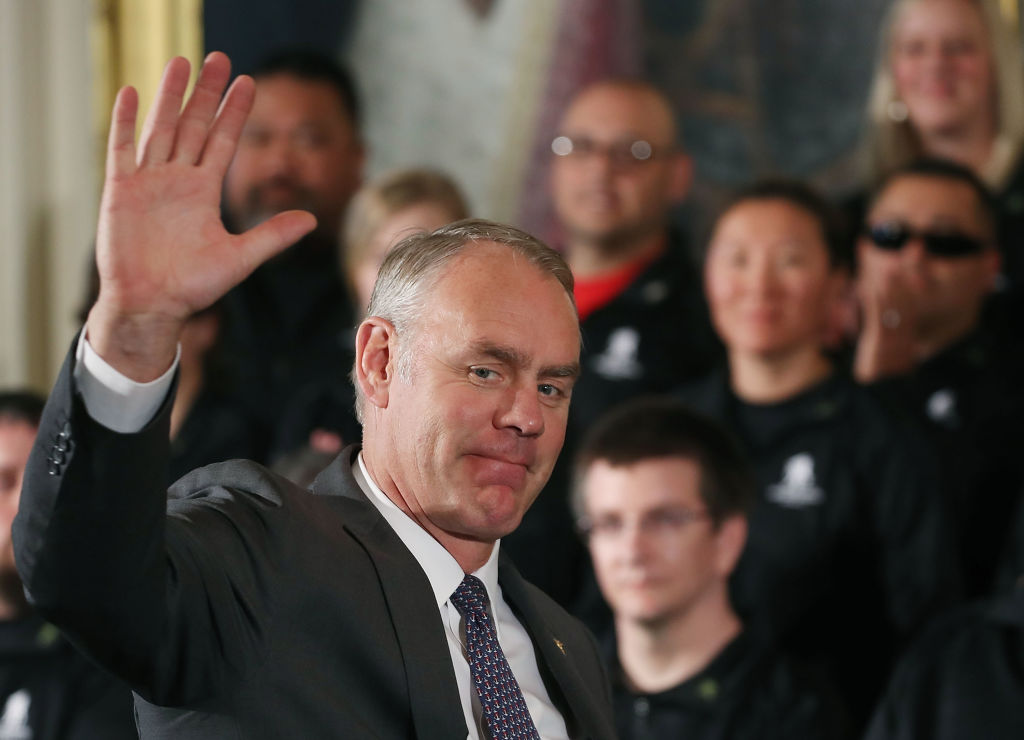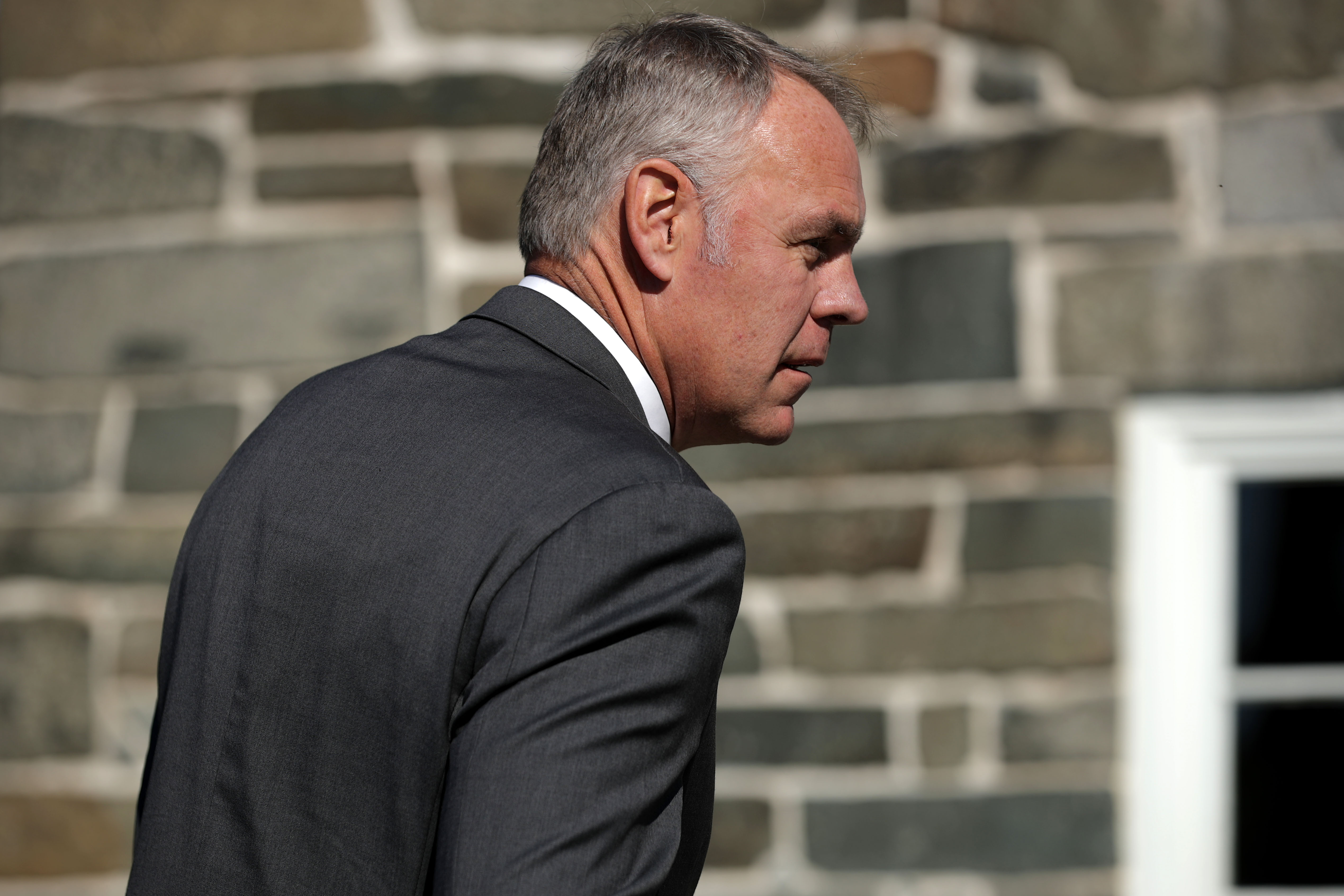Ryan Zinke will end his tenure as Interior Secretary at the end of the year, Donald Trump tweeted on Saturday.
The news comes amidst a whirlwind of scandal surrounding the secretary and as inquiries into his misconduct, including an investigation referred to the Justice Department in late October for potential criminal violations.
Secretary of the Interior @RyanZinke will be leaving the Administration at the end of the year after having served for a period of almost two years. Ryan has accomplished much during his tenure and I want to thank him for his service to our Nation…….
— Donald J. Trump (@realDonaldTrump) December 15, 2018
Good government groups and environmental groups cheered the announcement.
VICTORY! Ryan Zinke will resign as @interior secretary amid his massive corruption and scandals. Zinke’s days of plundering our lands and using his public office for personal gain are over. https://t.co/UFDK3J29zX
— Friends of the Earth (@foe_us) December 15, 2018
It's because of all those federal investigations into him, right? https://t.co/iwMeteE93V https://t.co/FHyeTZQs3l
— Citizens for Ethics (@CREWcrew) December 15, 2018
Zinke’s departure comes a month after the midterm elections, which saw Democrats take back the House.
When asked about Zinke’s fate the day after the elections, President Donald Trump said during a White House press conference “we’re looking at that,” adding they may have an answer “in a week.”
Zinke’s conduct spurred at least 15 different federal investigations during his time in President Donald Trump’s cabinet, according to Citizens for Responsibility and Ethics in Washington (CREW). With Democrats back in control of the House — and with their promise to ramp up oversight — it’s likely Zinke’s actions would have faced increased scrutiny.
A ‘walking conflict of interest’ is expected to take over as Interior secretary when Ryan Zinke leaves at the end of the year, creating even more ethical headaches for the agency. https://t.co/qC1xXRwmkq
— Mark Hand (@MarkFHand) December 15, 2018
While some of the investigatory findings have cleared the secretary of wrongdoing, a number were closed unresolved due to either a lack of cooperation from the Interior Department or insufficiently maintained records. Several of the probes that remain open center on whether Zinke used his public office for personal gain.
This includes an investigation into his involvement in a Montana land deal backed by the chairman of oil giant Halliburton. Another examines his decision not to grant two tribes approval for a Connecticut casino following lobbying from gambling giant MGM Resorts International.
Just weeks prior to the announcement of his impending departure, the Interior Department’s inspector general had referred at least one of their ongoing investigations to the Department of Justice (DOJ). According to both the New York Times and the Washington Post, it is the Montana land deal investigation that was referred to the Justice Department.
Cases are only referred to the DOJ in situations where potential criminal violations may have occurred. And on November 1, it was reported that the White House has been “growing increasingly concerned” about the investigation. According to officials who spoke to the Washington Post, “Trump told his aides that he is afraid Zinke has broken rules while serving as the interior secretary and is concerned about the Justice Department referral.”
The move to refer the case to the Justice Department also came amid confusion regarding the status of the Interior Department’s watchdog itself.
Earlier in October, it was reported that the Interior Department was going to replace its acting inspector general — who has been in the position since 2009 — with a Republican political appointee from the Department of Housing and Urban Development (HUD). An Interior spokesperson disputed this account and it seems the department’s acting inspector general is still in their position. Meanwhile, the person named as the potential replacement from HUD has since resigned from the department.
According to The Hill, however, Interior’s inspector general office referred the investigation to the DOJ before the reported attempts to reassign a Trump appointee to the role. One source speaking to The Hill called the timing “incredibly circumspect.”
Zinke is the second administration official tasked with setting environmental policy to leave amid growing scandals and investigations.
In July, former Environmental Protection Agency administrator Scott Pruitt stepped down from his post. Among other issues, his resignation came after the EPA inspector general referred a case involving Pruitt’s sweetheart condo deal with the wife of an energy lobbyist to the Justice Department.
Wildlife across the US upon hearing of Zinke's departure. #ByeZinke pic.twitter.com/9gheiUkjgI
— Sierra Club (@SierraClub) December 15, 2018
Several other cabinet secretaries and senior administration officials have similarly resigned from the Trump White House in his limited time in office. Health and Human Services Secretary Tom Price resigned last September after it was revealed he spent nearly half a million taxpayer dollars on first class flights. Staff secretary Rob Porter stepped down in February after both of his ex-wives accused him of domestic abuse. In all, more than three dozen officials have publicly resigned or been fired in less than two years in office.
Like Pruitt, Zinke’s tenure at the Interior Department was not only marked by scandal but by a persistent effort to serve the interests of fossil fuel and mining industries. During one industry event, Zinke told the oil and gas industry that “the government should work for you.”
The Trump administration’s efforts to shrink national monuments — led by Zinke’s Interior Department — was, for instance, motivated specifically by the desire to open up more land to fossil fuel and mining extraction.
Let the memory live again. The time Ryan Zinke ordered a Park Police helicopter to fly him back to Washington in time for a late-afternoon horseback ride with Vice President Mike Pence. https://t.co/RSiF0vqbq1
— Mark Hand (@MarkFHand) December 15, 2018
Zinke also oversaw the rollback of offshore drilling rules that were put in place after the BP Deepwater Horizon disaster in the Gulf of Mexico. Along with this came removing the requirement for companies to disclose the types of chemicals used in fracking.
The former secretary also faced criticism for the way he ran the department internally. Questions over scientific integrity and the censoring of climate science have plagued the department. And under his leadership, Zinke has made controversial moves to reorganize the department as well as facing criticism for disproportionately targeting women and Native Americans in a series of reassignments last year.




